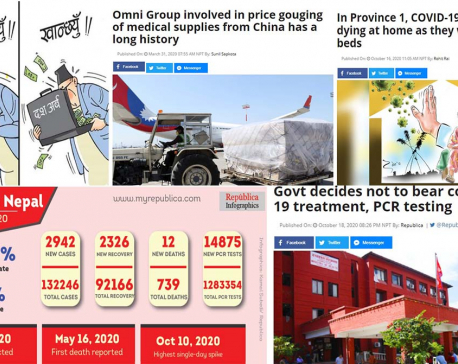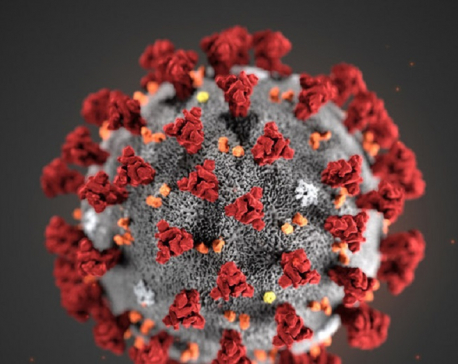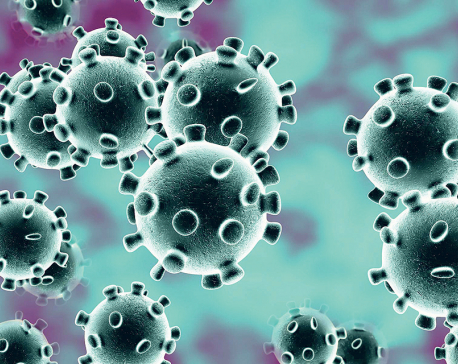
OR
_20201228143413.jpg)

Dr Prakash Budhathoky
The author is a treasurer at Central Executive Committee of Nepal Medical Associationnews@myrepublica.com
Studies have shown than mouthwash and toothpaste can help slow down Covid-19 transmission.
Dental health care providers are considered to be at highest risk of acquiring the infection because of prolonged face-to-face exposure to patients, exposure to respiratory secretions and aerosols produced during procedures like ultrasonic scaling and cavity/access preparation using a high speed air rotor with water jet cooling systems. Dental procedures causing splatters, fomites and aerosols can propel a high viral load in the procedure room thereby increasing the risk of cross infection between dental practitioners, patients, as well as dental auxiliary staffs.
Recent observations have proven that salivary glands act as the reservoir for virus. Active and live virus was isolated from saliva of patients who were asymptomatic or were considered free of the disease. It is likely that SARS-CoV-2 virus originating in the mouth contributes to disease transmission, especially in persons with asymptomatic Covid-19 who are not coughing. This suggests that reducing virus in the mouth could help prevent transmission during the time that oral care products are active.
In this context, a Cardiff University study has found that mouthwash containing cetylpyridinium chloride can kill coronavirus within 30 seconds. It is currently under clinical trial and there are concerns that it can kill virus in saliva but cannot be used as a treatment for Covid-19. Meanwhile, another research recently published in Journal of Dental Research concluded that mouthwashes with antiviral ingredients could help to decrease Covid-19 transmission by reducing viral loads in the mouths of infected patients when they cough, sneeze or speak.
However, not all mouthwash and toothpaste can kill the virus. Most common mouth wash containing chlorhexidine was found to reduce the viral load post gargling for two hours. This decrease was transient and the viral load increased again. Mouthwash containing hydrogen peroxide was not found to significantly decrease in SARS-CoV-2 intraoral viral load. Hydrogen peroxide at the recommended oral rinse concentrations of 1.5 percent and 3.0 percent was minimally effective.
In a lab study, SARS-CoV-2 virus was completely inactivated by povidone-iodine. Likewise, thrice-daily gargling with povidone-iodine for 30 seconds resulted in 100 percent viral clearance as early as four days after the intervention in patients with confirmed stage 1 Covid-19, which includes asymptomatic persons and first two days of the illness.
Recent laboratory studies have shown that toothpastes containing zinc or stannous fluoride and mouthwash formulas with cetylpyridinium chloride (CPC) can effectively neutralize SARS-CoV-2, in reducing the amount of SARS-CoV-2 in the mouths of people who have Covid-19 and potentially slowing down the spread of the virus. Toothpastes were found to neutralize 99.9 percent of the virus after two minutes of contact. Mouthwashes were effective after only 30 seconds. The results suggest that some toothpastes and mouthwashes may help slow down the spread of SARS-CoV-2 by temporarily reducing the viral load in the mouth. While brushing and rinsing are not a treatment or a way to fully protect an individual from infection, they may help to reduce transmission and slow the spread of the virus, supplementing the benefit we get from wearing masks, social distancing and frequent hand-washing.
This suggests that using toothpastes containing Povidine-iodine may be helpful. Three doses of antiviral mouthwash can be used the day before a meeting, and one dose the morning of the event. If Covid-19 patients use mouthwash regularly for seven to ten days, it could be beneficial. The government of Nepal endorsed the Interim Infection Prevention and Control Guidance for Dental Settings during the Coronavirus Disease 2019 (COVID-19) Pandemic, which was approved by Nepal Medical Council on June 2 and Ministry of Health and Population on July 24 whereby one minute mouth-rinse and mouthwash was made mandatory before any dental check up and procedures. This adds to the credence to the findings of the studies mentioned above.
You May Like This

As Oli government limits its role to counting deaths during the greatest public health crisis, people are dying at an alarming rate
Experts say the government has decided to shred the constitution ... Read More...

48 more test positive for COVID-19 in Gulmi
GULMI, June 19: Forty-eight more cases of COVID-19 were reported in Gulmi on Friday. ... Read More...

MoHP reports 250 fresh cases of COVID-19, tally jumps to 4614
KATHMANDU, June 11: With 250 new cases of coronavirus today, Nepal's COVID-19 tally climbed to 4614, the Ministry Health and... Read More...




Just In
- Insurers stop settling insurance claims after they fail to get subsidies from government
- Nepal-Qatar Relations: Prioritize promoting interests of Nepali migrant workers
- Health ministry to conduct ‘search and vaccinate’ campaign on May 13
- Indian customs releases trucks carrying Nepali tea, halted across Kakarbhitta
- Silent period for by-election to begin from midnight
- SC issues short-term interim order to govt and TU not to take immediate action against TU legal advisor Khanal
- National consultation workshop advocates to scale up nutrition smart community in Nepal
- Patan High Court issues short-term interim order to halt selection process of NTB’s CEO













Leave A Comment